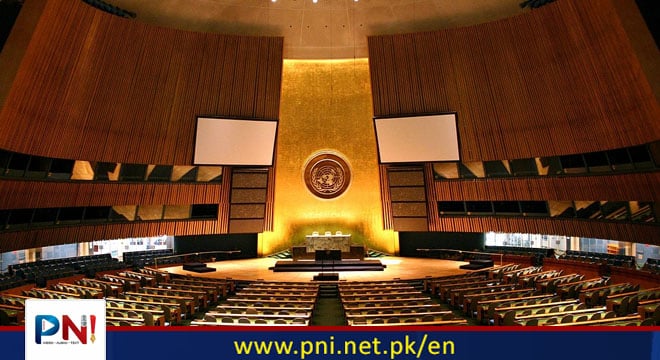UNITED NATIONS, Dec 12 (APP): The UN General Assembly is resuming its Emergency Special Session on Tuesday afternoon on the decades-long Israel-Palestine conflict, as the Israeli attacks against Gaza show no signs of abating and the Security Council remains deadlocked on further action. The 193-member Assembly is due to vote on a draft resolution demanding an immediate humanitarian ceasefire.
So far there are 21 co-sponsors, including Pakistan, of the resolution and two amendments tabled, one by Austria and the other by the United States. Some 80 speakers, including Pakistan, are scheduled to address the Assembly so far and the session is expected to continue beyond this evening. The General Assembly meeting comes on the heels of the latest Security Council meeting on Friday which failed to adopt a similar resolution demanding an immediate humanitarian ceasefire and unconditional release of hostages as well as humanitarian access.
That resolution was not adopted owing to a negative vote by a permanent member United States, 13 Council members voted in favour and the United Kingdom abstained. The Security Council emergency meeting was convened followed the Secretary-General’s invocation of Article 99 of the UN Charter one of the most powerful tools at his disposal urging the body to help end carnage in the war-battered enclave. Egypt is slated to introduce the draft, which has been sponsored by Algeria, Bahrain, Comoros, Djibouti, Egypt, Iraq, Jordan, Kuwait, Lebanon, Libya, Mauritania, Morocco, Oman, Qatar, Saudi Arabia, Somalia, Sudan, Tunisia, United Arab Emirates, Yemen, and the State of Palestine. The draft resolution in front of the Assembly Tuesday afternoon has some notable differences from the one vetoed by the US in the Council on Friday. The draft takes note of a 7 December letter from the UNRWA Commissioner-General addressed to the President of the General Assembly. In that letter, Philippe Lazzarini warned that the agency’s ability to implement its mandate in Gaza is severely limited and that the primary platform for humanitarian assistance to over 2.2 million people in the enclave is on the verge of collapse. The draft also refers to previous resolutions regarding the Question of Palestine as well as the relevant Security Council resolutions on the topic. The key points in common, include an immediate humanitarian ceasefire; demanding that all parties comply with their obligations under international law, notably regarding the protection of civilians; and a demand for the immediate and unconditional release of all hostages, as well as ensuring humanitarian access.
Austria has proposed an amendment, that inserts the phrase, held by Hamas and other groups in relation to the hostages still being held by Palestinians in Gaza, as well as inserting the word immediate in reference to ensuring humanitarian access. The US amendment reflects its continued point of contention regarding Hamas. Resolutions by the General Assembly, though not legally binding on nations, do carry immense moral weight, representing the collective resolve of the UN membership on a matter of grave importance. These resolutions also lead to key legal frameworks and standards, such as the over 60 human rights instruments underpinning the international rights regime, which emanate from the Universal Declaration of Human Rights. The Declaration was proclaimed by the General Assembly in 1948, and by itself is not binding. The session today is a continuation of the tenth emergency special session of the General Assembly that last met on 26 October amid the present crisis in Gaza, during which it adopted a resolution on the crisis, calling for an immediate, durable and sustained humanitarian truce leading to a cessation of hostilities.
The emergency special session is convened pursuant to the Assembly 1950 landmark Uniting for Peace resolution, under which the body can convene an emergency special session within 24 hours, should the Security Council fail to exercise its primary responsibility for the maintenance of international peace and security. The session convened for the first time in April 1997, following a request from Qatar. It followed a series of Security Council and General Assembly meetings regarding the Israeli decision to build a large housing project in an area of East Jerusalem.
Follow the PNI Facebook page for the latest news and updates.









